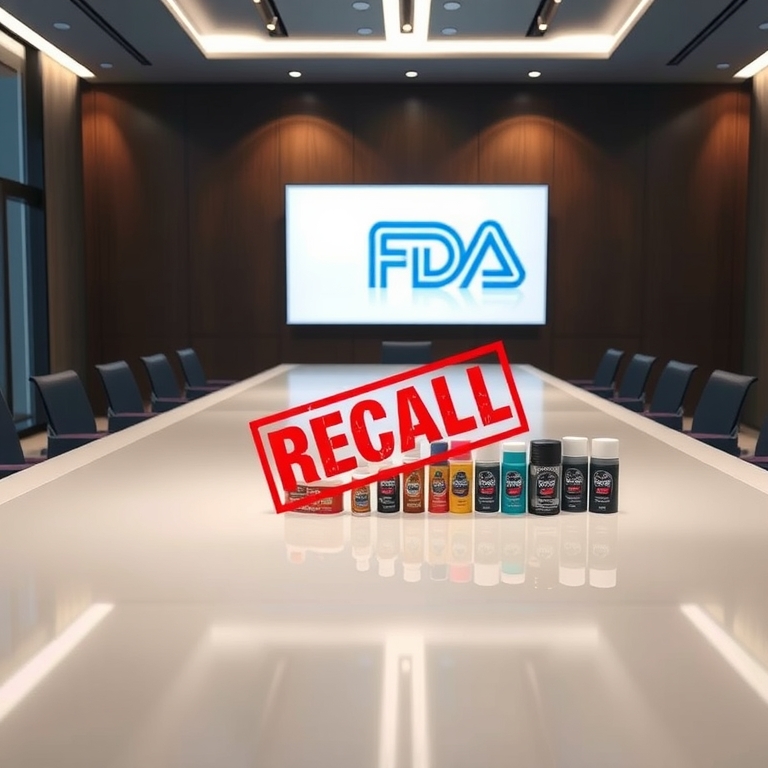In an unexpected move that has sent ripples through the personal care industry, the U.S. Food and Drug Administration (FDA) has issued a recall on several popular brands of deodorants due to concerns over potential health risks. This recall, which underscores the agency’s commitment to consumer safety, comes after a series of rigorous tests and analyses revealed the presence of potentially harmful substances in these everyday products.
The decision to recall these deodorants is significant, not only because of the widespread use of these products but also due to the implications it holds for manufacturers and consumers alike. Deodorants are a staple in personal hygiene regimens across the globe, with millions relying on them daily to combat body odor and maintain freshness. However, the FDA’s findings have raised pressing questions about product safety standards and the oversight mechanisms that are in place to protect consumers from exposure to harmful chemicals.
At the heart of the recall is the detection of benzene, a known carcinogen, in certain batches of deodorants. Benzene is a chemical compound that is widely used in the manufacturing of various products, including plastics, resins, and synthetic fibers. However, its presence in consumer products, particularly those applied directly to the skin, is concerning due to its potential to cause harmful effects, including cancer, with prolonged exposure. The FDA’s stringent regulations typically prohibit the presence of benzene in personal care products, which makes the detection of this compound in deodorants particularly alarming.
The recall affects a broad spectrum of products from several well-known brands, many of which have been trusted household names for decades. For these companies, the recall represents a critical juncture as they grapple with the dual challenge of addressing immediate safety concerns while also rebuilding consumer trust in their brands. In response to the FDA’s action, many of the affected companies have been quick to issue statements expressing their commitment to safety and transparency. Some have voluntarily halted production of the affected products and are conducting their own investigations to determine the root cause of the contamination.
For consumers, the recall is a sobering reminder of the importance of being vigilant about product ingredients and the potential risks associated with everyday items. The FDA has advised consumers to check their deodorant products against the recall list and to discontinue use of any that are affected. Additionally, individuals who have experienced any adverse reactions after using these products are encouraged to report their experiences to the FDA’s MedWatch program, which plays a crucial role in monitoring the safety of consumer products.
The implications of this recall extend beyond immediate safety concerns. It also raises broader questions about regulatory oversight and the processes that govern the safety of personal care products. In recent years, there has been growing advocacy for more stringent regulation of the cosmetics and personal care industry, which is currently governed by less rigorous standards compared to other sectors, such as food and pharmaceuticals. The FDA’s recall could serve as a catalyst for renewed discussions and potential reforms aimed at strengthening safety standards and ensuring greater accountability within the industry.
Moreover, this development is likely to have a ripple effect on the market, influencing consumer behavior and potentially prompting a shift towards more natural and organic personal care products. In recent years, there has been an increasing trend towards clean beauty and products that are free from synthetic chemicals and additives. This recall could accelerate that trend, as consumers become more cautious and discerning about the products they choose to incorporate into their daily routines.
In the corporate realm, the recall is a stark reminder of the importance of maintaining rigorous quality control and testing procedures. For companies, safeguarding consumer trust is paramount, and any lapse in product safety can have significant reputational and financial repercussions. The affected brands will need to navigate the delicate process of managing public perception and restoring confidence in their products. This may involve not only addressing the immediate concerns raised by the recall but also implementing long-term strategies to enhance transparency and safety protocols.
As the situation continues to unfold, stakeholders across the industry, including regulators, manufacturers, and consumers, will be closely watching the developments. The FDA’s swift action underscores its mandate to protect public health and ensure that consumer products meet the highest safety standards. For the personal care industry, this recall serves as a crucial reminder of the responsibilities that come with producing products that are integral to consumers’ daily lives.
In conclusion, the FDA’s recall of deodorants over health risk concerns is a significant development that has brought issues of product safety and regulatory oversight to the forefront. As the industry navigates this challenging period, the lessons learned from this recall will undoubtedly shape the future landscape of personal care products, driving efforts towards greater safety, transparency, and consumer trust.

Leave a Reply